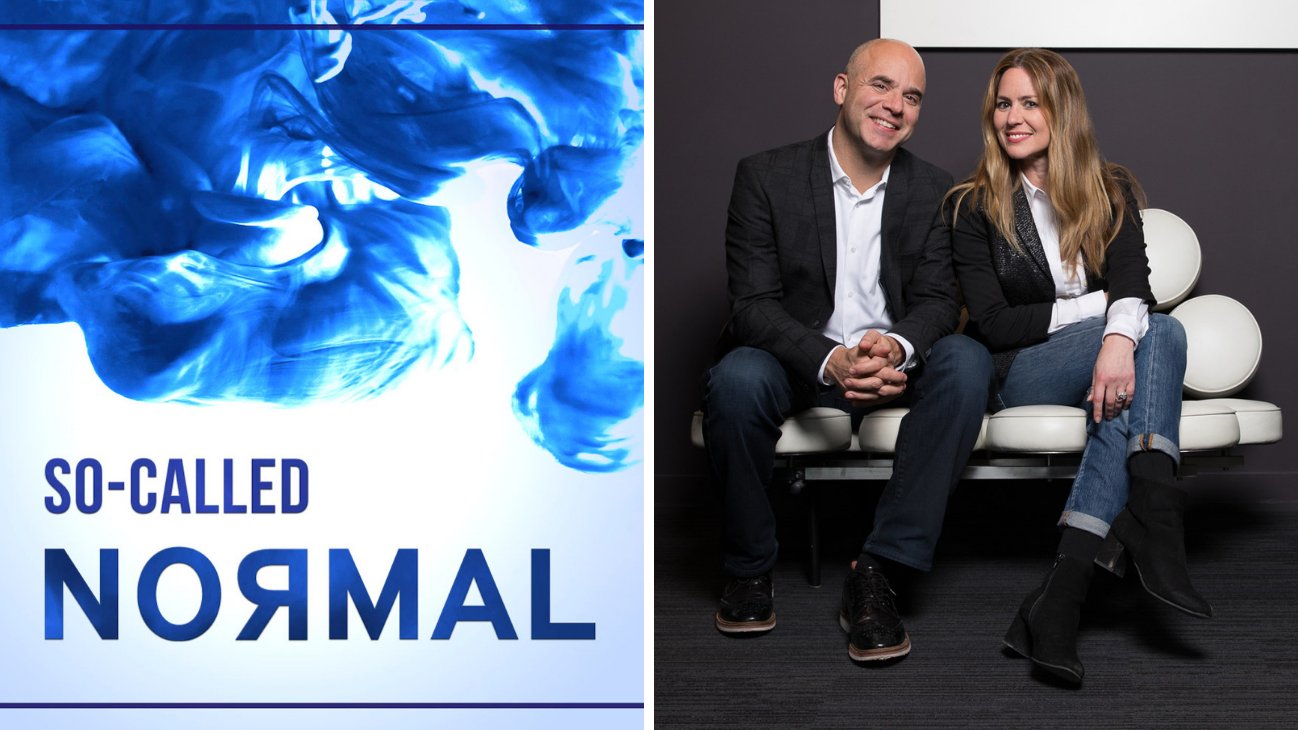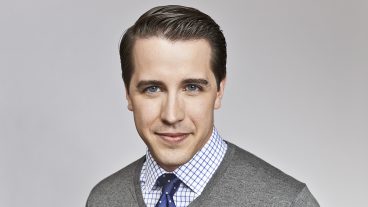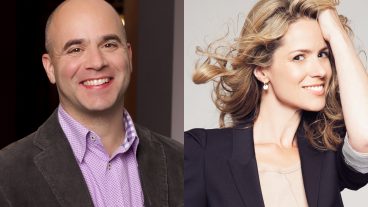Speakers’ Spotlight has a unique origin story. In celebration of booking our 30,000th event this year, our co-founders — and husband and wife team! — Martin and Farah Perelmuter joined Mark Henick on his podcast, So Called Normal, to talk about their entrepreneurial journey, the speaking industry, and how they managed to stay married through it all.
We’ve been lucky to work with Mark as a speaker for the past few years. He’s an incredible mental health advocate and strategist who has a diverse and unique perspective as someone who has been a patient, a professional, a policy influencer, and a public figure in the mental health system.
Mark’s TEDx talk, “Why We Choose Suicide” is among the most watched in the world, with more than six million views. Now after years of telling his own story, Mark sits down with others to share their stories of struggle and resilience.
Mark invited Martin and Farah to join him on his podcast to learn more about their unique entrepreneurial story, how they managed to grow a successful company while raising a family, and, of course, to share a few tips on how to be an effective speaker.
Origin Story
It’s been 24 years since Martin and Farah got married, quit their jobs, and opened a speakers’ bureau — an industry neither of them were very familiar with. Martin had a background in law, and Farah had previously worked in an advertising agency.
Farah’s uncle was an aspiring speaker who asked her to help him market himself — she said yes, and then quickly dove into the speaking world to figure out what it’s all about. She started by attending meetings by the National Speakers Association and the Canadian Association of Professional Speakers. Eventually, she roped Martin into it as well, and they both did as much research as possible — without the ease of Google back then — before going all in and starting their own business.
“We were young and naïve — we were 25 at the time — and thought, let’s start a business together, how difficult could it be? That’s the advantage of having youth and naivety, which is a nice word for stupidity, on your side,” said Martin.
And it was the best thing they did, Farah added, saying that they had no regrets. Coming from outside of the industry actually turned out to be a huge advantage. They took more risks and tried new things, some of which they may have hesitated on if they were older or more experienced. They did things differently and they did what made sense to them, which they believe is a big reason for their success.
It took six months to get their first six bookings, and about 80-100 cold calls a day. It was hard, and they went through several months making $0 in revenue, but they had a longer goal in mind to keep them focused and driven.
“The way I would best describe it,” Martin says, “and I think this goes for a lot of people who start a business from scratch, is that it’s kind of like banging your head against the wall 100 times a day, but after awhile it doesn’t really hurt that much.”
The turning point came when one client booked six speakers — in that moment their total number of events doubled. It took months of phone calls and negotiation, but it taught both Martin and Farah to have patience, and emphasized how important trust and relationship-building would be in the success of their company.
Since then, they’ve continued moving forward, growing from a two-person company to a team of 35, plus our paw-sonal assistant, Lucy. And there’s no plans to slow down.
“I think you’ve got to continue to strive forward,” says Martin. “The business changes, the industry changes and evolves and you just have to continue trying to stay relevant, be ahead of the change if you can, and anticipate where things are going. So, I think for me, as soon as we rest on our laurels and feel like ‘oh, we’ve made it’ that’s probably the beginning of the end.”
“Also, by working with all of our incredible speakers,” adds Farah, “they really make us creative and they inspire us. You can’t help but continue to grow as you work with these fascinating people.”
Finding Balance
In the beginning, both Martin and Farah shared the same role, but it quickly became apparent where their individual strengths lay and what they each enjoyed doing. Farah handled the marketing and Martin spearheaded sales and operations.
Of course, they both collaborated, and continue to do so today, but a lot of the balance they have found in running the company together was through understanding their roles and “staying in their lane” as Martin calls it.
They also made a rule — no talking about the business after 8pm and on weekends. As their family grew, welcoming a daughter and then a son, the rule expanded to no talking about work at home. At home they were parents, and their kids kept them accountable to that.
Of course, it was difficult when so much of their lives were consumed by their business, but striking this balance between work and home helped them stay connected beyond the business, and maintain a loving family life.
The Speaking Industry
Throughout the more than two decades Martin and Farah have been immersed in the speaking world, they’ve met some incredible speakers. Mark asked them what’s the difference between a good speaker and a great one.
“Connecting with an audience is why you’re there,” Martin said. “The best speakers are not just the ones who are the most articulate or the most passionate, I think it’s the speakers who can connect their message, their story, their expertise with the audience and put the audience in their story.”
It’s important to continually evolve your talk and refresh it. And, of course, customization is the clincher. Being able to adapt some of your anecdotes to really reflect who’s sitting in front of you can exponentially expand your impact on them. Plus, if you can add a bit humour, you’ll hit it out of the park.
Also, Farah added, great speakers don’t over-rehearse and are comfortable with not being too polished. This brings authenticity to the stage. They also don’t depend on their visuals. Too often, mistakes happen and you have to be prepared to go without them.
The best part of the speaking industry though, for both Farah and Martin, is hearing feedback from clients, especially when they not only enjoyed the speaker but could see the impact their talk had throughout their organization. It’s those moments that help us stay connected to our core belief — that a speech can change the world.
“We don’t see ourselves as slot-fillers,” Martin said. “We don’t see our job as ‘someone has an hour to fill at a conference and we fill that hour.’ We really look at the impact that it can have on the individual people in the audience as well as the organization.”
Hear more from Martin and Farah by listening to the podcast below, and subscribe to “So Called Normal” to hear more fascinating stories.




